The ninth month of the Islamic lunar calendar is the holy month of Ramadan, which began for Muslims worldwide on March 10. During this month, Muslims abstain from eating and drinking during the day, an act of penance that teaches self-control, reinforces one’s faith and helps one become more mindful of God.
There are about 60,000 Muslims in Taiwan, many of them migrant laborers or students from Southeast Asia, the Middle East or Africa. Some too, are Taiwanese.
Yahya, a 29-year-old civil engineer, has spent 10 years living in Taiwan. He is an Iraqi who initially traveled to the US to study Mandarin Chinese and where he later obtained his engineering degree.
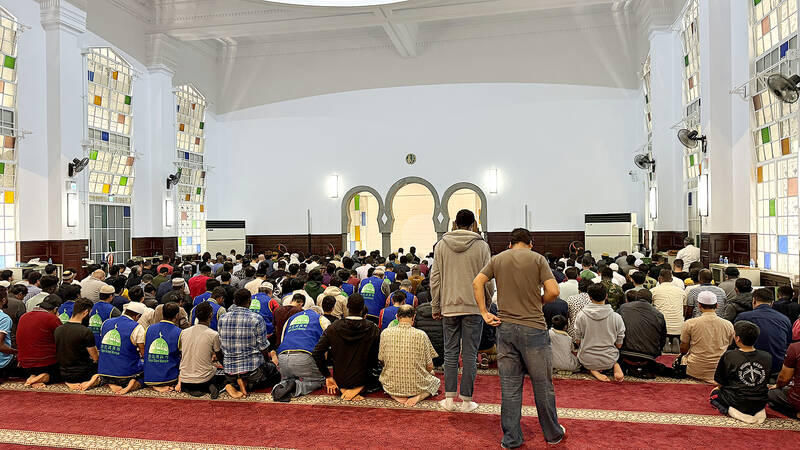
Photo: Bing Wang
Getting used to his new environment was challenging because he knew little about Taiwan before he arrived. Luckily, he discovered a supportive group at the Taipei Grand Mosque, where he now regularly attends prayers and helps out whenever he has free time.
TAIWAN’S LARGEST MOSQUE
After the Chinese Civil War, many Chinese Muslims migrated to Taiwan with the Chinese Nationalist Party (KMT) in 1949. They lobbied high-ranking KMT officials to construct a mosque because they needed a place of prayer. The building was finished in April, 1960 with assistance from the government, a loan from the Bank of Taiwan and donations from Jordan and Iran. In 1999, the government of Taipei City recognized the mosque as a historic site.
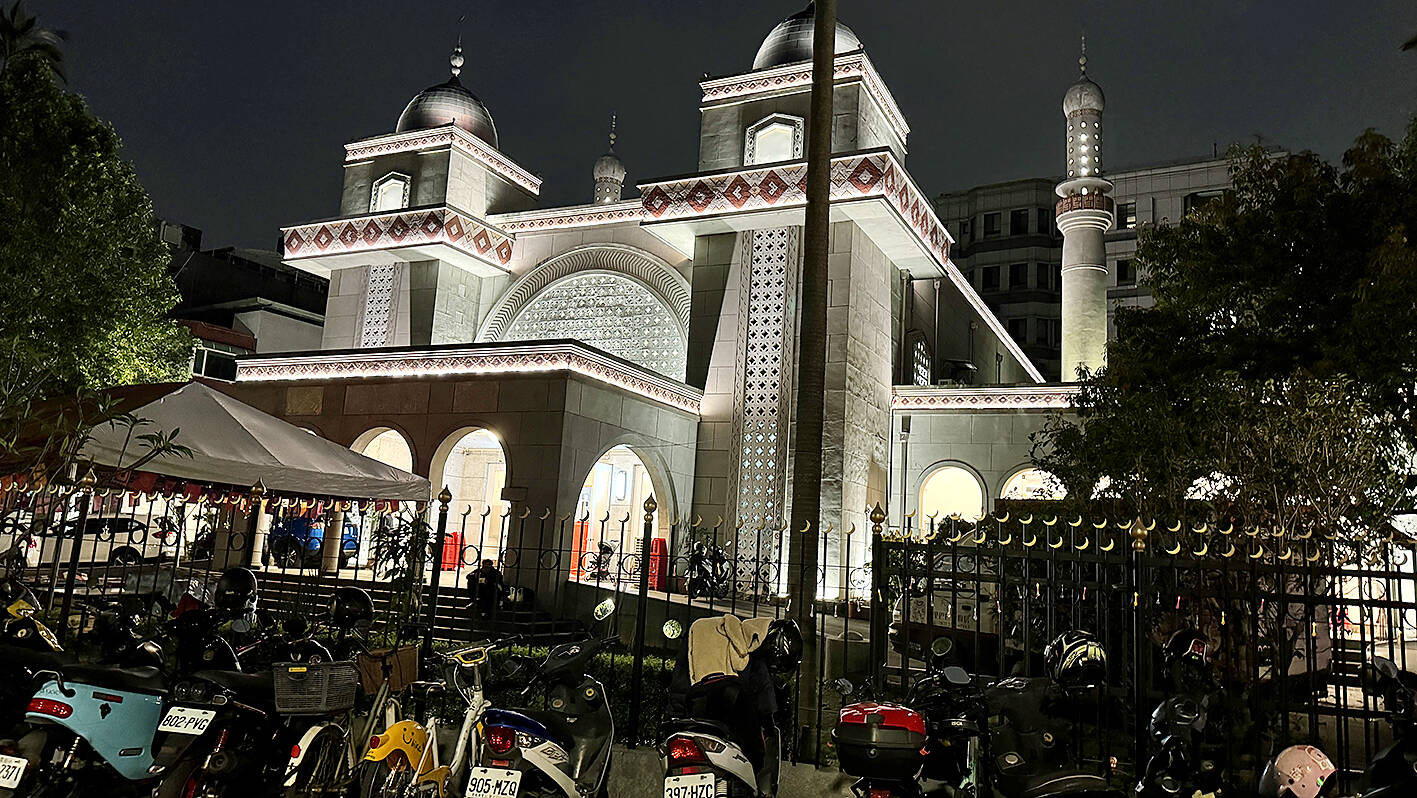
Photo: Bing Wang
Every Friday afternoon, prayers are held in the Taipei Grand Mosque (台北清真寺), and hundreds of Muslims attend. The mosque also hosts daily Suhoor and Iftar meals before sunrise and sunset during the holy Islamic month of Ramadan.
Yaser Cheng (鄭泰祥), the mosque’s chairman, says nearly 600 people from 25–30 nations come for the Iftar meal every night. For example, Shaheen, a Somali graduate student at National Taiwan Ocean University in Keelung, often travels an hour to get to the Taipei Grand Mosque.
During Ramadan, Yahya is one of many who donate their time at the mosque to set up tables and chairs, serve food and clean up after meals. He says, “The mosque has done a fantastic job of creating a sense of community here.”
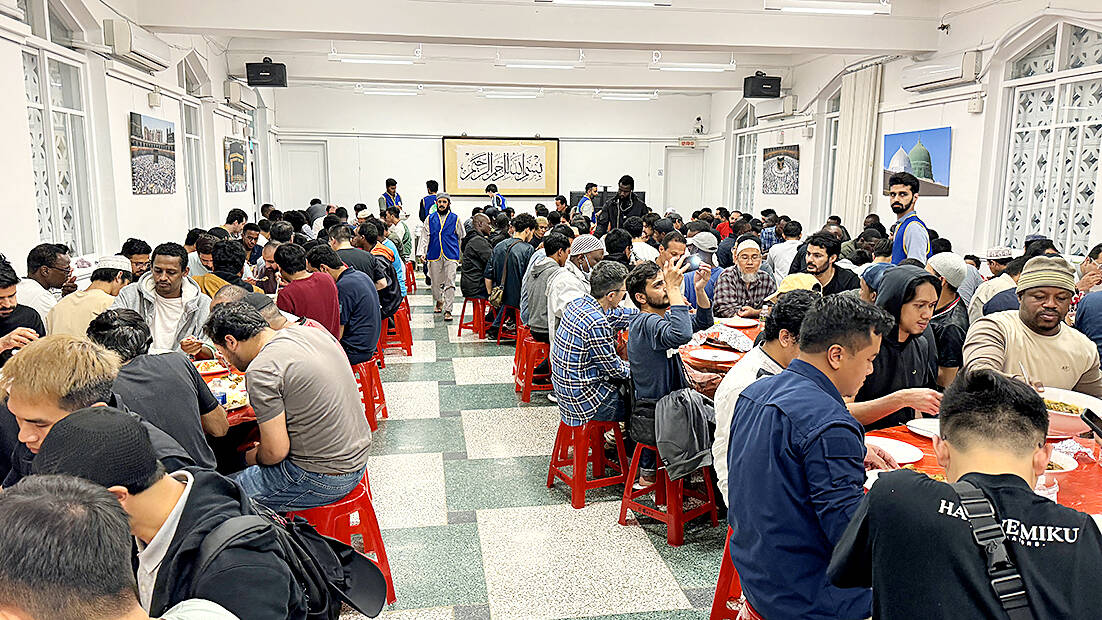
Photo: Bing Wang
The mosque offers weekly classes for Muslim children as well as online resources — the official website details the locations of Halal restaurants, and lists places where Muslims are specifically allowed to worship.
However, Islamophobia is not absent from Taiwan. Patu, an Indonesian migrant construction worker, says his wife often gets stares from Taiwanese because she wears a hijab. He recounts a time overhearing people saying she might have a bomb hidden underneath it.
Just last month, Minister of Labor Hsu Ming-chun (許銘春) made comments that were deemed racist, asserting Taiwan should attract migrant workers from northeastern India because “their skin color and dietary habits are closer to [Taiwanese]” as they are mostly “Christians.” Muslims actually account for 14 percent of India’s population, compared with just 2.3 percent of the population that subscribe to Christianity. The minister faced criticism for the remarks and issued an apology days after.
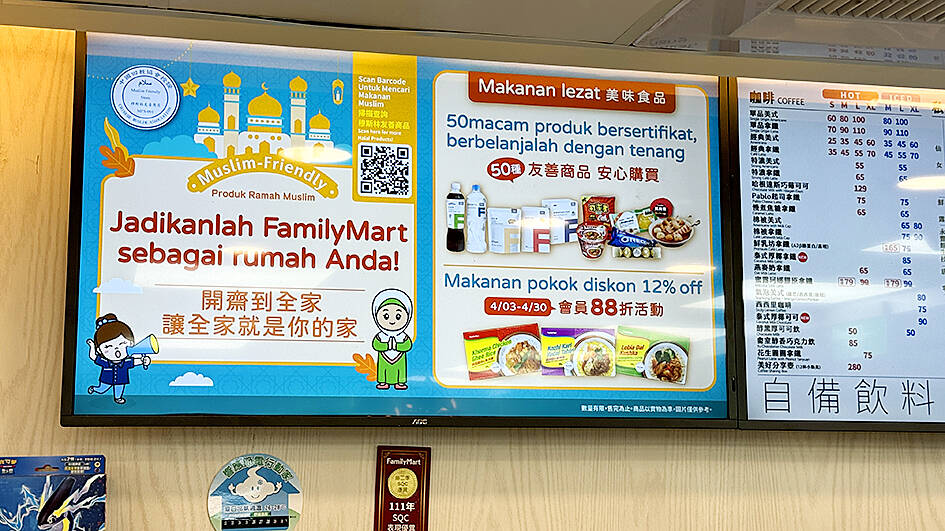
Photo: Bing Wang
TOLERANCE IN TAIPEI
Notwithstanding some episodes of xenophobia, Imam Ibrahim Chao (趙錫麟) of the Taipei Grand Mosque believes Muslims all over the world praise Taiwan. He says Taiwan has, for the most part, done a good job of giving Muslims a secure environment to practice their faith.
In 2022, The Halal in Travel Awards (HIT) named Taiwan the most Muslim-inclusive destination for a non-Organization of Islamic Cooperation (OIC) country. The 2023 Global Muslim Travel Index ranked Taiwan the third-most Muslim-friendly non-OIC destination. Taiwan’s capital Taipei won the “Most Promising Muslim-friendly City Destination of the Year (non-OIC)” award in the same Index.
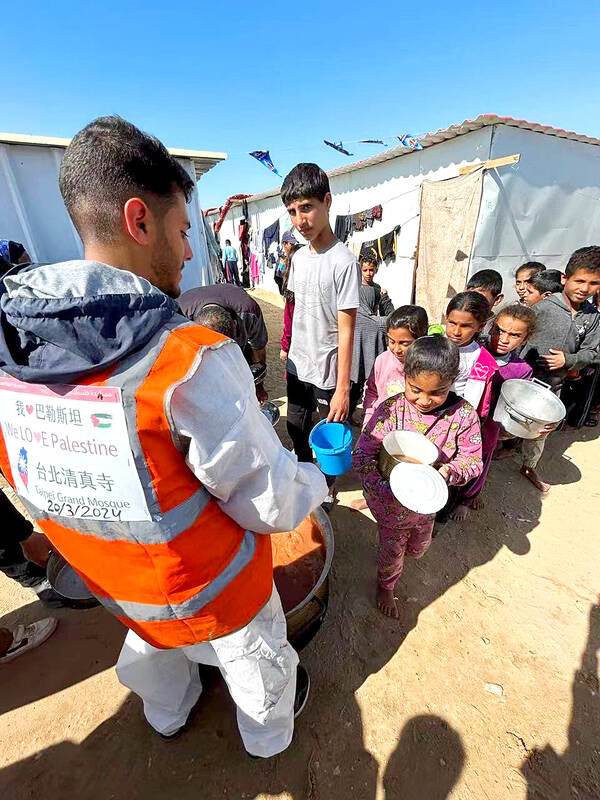
Photo Courtesy of Taipei Grand Mosque
The Taipei Grand Mosque frequently organizes fundraisers for Muslims facing humanitarian disasters worldwide. The mosque offered prayers for the earthquake victims and gave tens of thousands of dollars to those in need when a 7.8-magnitude earthquake hit Turkey and Syria in February last year, killing 50,000 people. A market has been organized on its front lawn, selling food and other items to collect money for Palestinians during the ongoing humanitarian crisis in Gaza, where millions of people are currently facing famine.
Donations were sent to non-governmental organizations, where they were used to purchase food, medical supplies and pay for other needs.
Yahya, who helped to arrange the fundraising campaign, says that these fundraising events help bring Taiwan’s Muslim community together. They inform Muslims that in addition to praying, they are here to support their Muslim friends worldwide.
“It’s great that the mosque is attempting to find more ways to introduce the Muslim community to Taiwanese people,” he says.

Growing up in a rural, religious community in western Canada, Kyle McCarthy loved hockey, but once he came out at 19, he quit, convinced being openly gay and an active player was untenable. So the 32-year-old says he is “very surprised” by the runaway success of Heated Rivalry, a Canadian-made series about the romance between two closeted gay players in a sport that has historically made gay men feel unwelcome. Ben Baby, the 43-year-old commissioner of the Toronto Gay Hockey Association (TGHA), calls the success of the show — which has catapulted its young lead actors to stardom -- “shocking,” and says

The 2018 nine-in-one local elections were a wild ride that no one saw coming. Entering that year, the Chinese Nationalist Party (KMT) was demoralized and in disarray — and fearing an existential crisis. By the end of the year, the party was riding high and swept most of the country in a landslide, including toppling the Democratic Progressive Party (DPP) in their Kaohsiung stronghold. Could something like that happen again on the DPP side in this year’s nine-in-one elections? The short answer is not exactly; the conditions were very specific. However, it does illustrate how swiftly every assumption early in an

Inside an ordinary-looking townhouse on a narrow road in central Kaohsiung, Tsai A-li (蔡阿李) raised her three children alone for 15 years. As far as the children knew, their father was away working in the US. They were kept in the dark for as long as possible by their mother, for the truth was perhaps too sad and unjust for their young minds to bear. The family home of White Terror victim Ko Chi-hua (柯旗化) is now open to the public. Admission is free and it is just a short walk from the Kaohsiung train station. Walk two blocks south along Jhongshan

Francis William White, an Englishman who late in the 1860s served as Commissioner of the Imperial Customs Service in Tainan, published the tale of a jaunt he took one winter in 1868: A visit to the interior of south Formosa (1870). White’s journey took him into the mountains, where he mused on the difficult terrain and the ease with which his little group could be ambushed in the crags and dense vegetation. At one point he stays at the house of a local near a stream on the border of indigenous territory: “Their matchlocks, which were kept in excellent order,